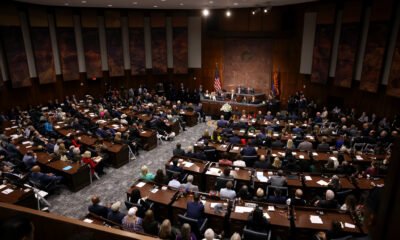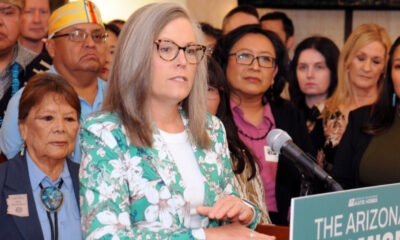Abel Chaparro
The Inmate Who Transformed Arizona’s Legal Landscape

Abelardo Chaparro, 50, outside of his home in Apache Junction. Chaparro’s case has set precedent for other cases like his where parole was discussed but never given as an option. Photo by Jerod MacDonald-Evoy | Arizona Mirror
Abelardo Chaparro, known as Abel, bears the weight of a troubled past. At 50 years old, he spent half his life incarcerated for a crime he claims was in self-defense. In 1995, at just 20, he shot and killed Reynaldo Martinez, who had been stalking him. Initially, jurors and prosecutors saw it differently, leading to Chaparro’s conviction for first-degree murder.
The sentence he received—a life sentence with no chance of parole for 25 years—seemed lost in time. Arizona’s rules underwent a significant shift in 1993 following a tough-on-crime movement, eliminating parole from life sentences while instituting “natural life” sentences without hope for reprieve. Despite this, for over two decades, attorneys continued to negotiate terms as if the old laws still held.
In a 2017 investigative series, spotlighting distortions in Arizona’s sentencing, it was revealed that around 250 inmates had wrongfully received sentences promising parole, including 90 tied to plea deals. The series ignited legislative action to restore parole hearings for some — but not for Chaparro and others left stranded by the law.
Chaparro’s release came after he read about the investigative piece while in prison. He took the initiative to connect with attorneys at the Arizona Justice Project, examined law books, and helped others navigate similar predicaments. A federal judge ultimately pressured the Arizona Supreme Court into reconsidering his case, emphasizing the need for equal treatment under the law.
On April 20, 2020, Abel secured his freedom, becoming the first of many who’ve since benefited from this landmark decision, often referred to as the “Chaparro-identified-parole-eligible cases.” However, the road to recovery has not been easy; many ex-prisoners face daunting challenges reintegrating into society.
Reflecting on his life in prison, Chaparro expressed the harsh realities of incarceration. “Nobody in my family had ever been in prison,” he said, emphasizing the pervasive violence and moral compromises made in such an environment. He cultivated a unique understanding of human psychology during his time behind bars, often using it to survive challenging encounters.
As he began to forge connections following his release, the gravitational pull of his past remained. His daughter, born after his arrest, never knew him until adult years. Despite receiving parole, the stigma from his actions haunts him. “You just feel so ashamed,” he admitted, encapsulating the conflict between his desire for redemption and the scars of his past.
Chaparro now seeks to terminate his parole entirely to pursue a contractor’s license, navigating another legal labyrinth. He has filed multiple petitions, hoping to prove he received ineffective counsel years prior. His journey signifies not just personal struggle but also a systemic failure that has left many without the justice they deserve.
Abelardo Chaparro’s story has set a powerful example, illustrating both the flaws in the legal system and the resilience of those who seek justice amidst it. His case has opened doors for others, highlighting the critical need for reform in Arizona’s approach to parole and justice.


















